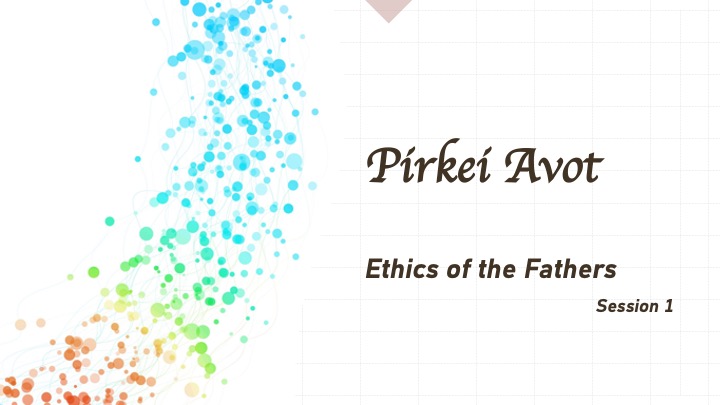Pirkei Avot Lesson 1
Sandy Kress

Ethics of the Fathers – Lesson Plan – Session One
I. Introduction of the Entire Book, this Multi-Part Exercise, and Today’s Session
II. Verses to Consider and Discuss
A. The men of the Great Assembly said three things: Be deliberate in judgment; develop many disciples; and make a fence for the Torah (Bible).1:1
Questions:
1. Aren’t you surprised that the very first piece of guidance is to be deliberate in judgment? What would you have thought it would be? What does it mean to be deliberate in judgment? Why might being deliberate in judgment deserve first mention, considering wisdom from both the OT and the NT, as well as ethics generally?
2. Also, why would raising up many disciples appear so high on the list? What exactly does it involve, why is it so important, and how might it best be done?
3. Finally, in the third-listed item, we finally get to the Bible, but why do you think it’s written as “making a fence around it?” What does that mean, what does that involve, and how would we do it? Can we think of places in both Jewish and Christian sacred text where this pursuit is well illustrated?
B. Simon the Righteous, one of the last survivors of the Great Assembly, would say: on three things the world depends – on Torah (Bible) study, on the service of God, and on bestowing loving-kindness. 1:2
Questions:
1. What exactly do we mean by Bible study? What all do you think that might consist of?
2. What does service of God consist of?
3. What do we believe bestowing loving-kindness consists of? Examples?
4. What are we to make of Simon’s saying “the world depends on” these three things?
C. Antigonos…was accustomed to say: Be not as servants who serve the master for the sake of receiving reward, but rather, be like servants who serve the master not for the sake of receiving even a token reward…1:3
Questions:
1. Don’t we tend to think there are rewards for most everything we do, including serving God? Where do we get such ideas?
2. Could it be that this guidance could be read less severely than it appears? Or not? Why not?
III. Conclusion – what are some takeaways of our study today? Why do you think that a whole book of sacred text involving ethics would begin with these three particular verses?